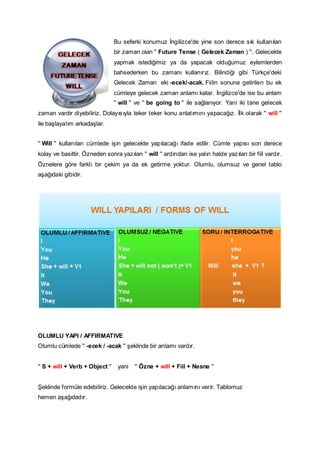
Future tense will konu anlatımı
- 1. Bu seferki konumuz İngilizce'de yine son derece sık kullanılan bir zaman olan '' Future Tense ( Gelecek Zaman ) ''. Gelecekte yapmak istediğimiz ya da yapacak olduğumuz eylemlerden bahsederken bu zamanı kullanırız. Bilindiği gibi Türkçe'deki Gelecek Zaman eki -ecek/-acak. Fiilin sonuna getirilen bu ek cümleye gelecek zaman anlamı katar. İngilizce'de ise bu anlam '' will '' ve '' be going to '' ile sağlanıyor. Yani iki tane gelecek zaman vardır diyebiliriz. Dolayısıyla teker teker konu anlatımını yapacağız. İlk olarak '' will '' ile başlayalım arkadaşlar. '' Will '' kullanılan cümlede işin gelecekte yapılacağı ifade edilir. Cümle yapısı son derece kolay ve basittir. Özneden sonra yazılan '' will '' ardından ise yalın halde yazılan bir fiil vardır. Öznelere göre farklı bir çekim ya da ek getirme yoktur. Olumlu, olumsuz ve genel tablo aşağıdaki gibidir. OLUMLU YAPI / AFFIRMATIVE Olumlu cümlede '' -ecek / -acak '' şeklinde bir anlamı vardır. '' S + will + Verb + Object '' yani '' Özne + will + Fiil + Nesne '' Şeklinde formüle edebiliriz. Gelecekte işin yapılacağı anlam ını verir. Tablomuz hemen aşağıdadır.
- 2. OLUMSUZ YAPI / NEGATIVE Olumsuz cümlede ise yapılması gereken diğer tüm zamanlarda olduğu gibi cümlede 2. öğe konumunda olan '' will '' den sonra '' not '' kısa yazılışı ile de '' n't '' yazmaktır. Hepsi bu kadar. '' S + will not ( won't ) + Verb + Object '' yani '' Özne + will not ( won't ) + Fiil + Nesne ''. Anlam olarak '' -me yecek /-mayacak '' tır. Tablomuz yardım edecektir.
- 3. SORU YAPISI / INTERROGATIVE Bu zamanda da diğer zamanlarda olduğu gibi yapılması gereken 1. öğe ile 2. öğeyi yer değiştirmek. Yani '' will '' özne ile yer değiştirerek cümle başına gelir. Yapılan tek değişiklik budur. Cümlenin geri kalanı aynen yazılır. '' Will + Subject + Verb + object '' yani '' Will + Özne + Fiil + Nesne '' Aşağıdaki tabloda görüldüğü gibi. CEVAP YAPISI / ANSWER FORM Cevap verirken ise soru yapmak için yerlerini değiştirdiğimiz özne ve fiilin tekrar eski yerine koyarız. Tabi başında '' Yes '' ve '' No '' ile birlikte. Tabloda gerekli açıklamalar mevcuttur.
- 4. Evet, arkadaşlar buraya kadar Simple Future Tense ( Gelecek Zaman )'i olumlu, olumsuz ve soru yapıları açısından inceledik. Bir sonraki yazıda bir diğer Gelecek Zaman olan '' be going to '' yu inceledikten sonra, bu iki zamanın karşılaştırmalarından tutun da tüm özel kullanımlarına kadar inceleyip konuyu bitireceğiz inşallah
